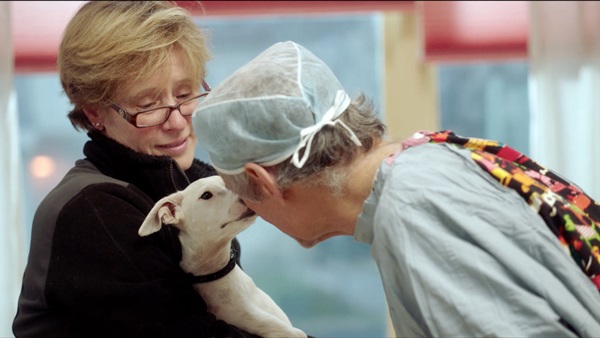
This reverent documentary centers on the Smith Ridge veterinary clinic in suburban New York City and its staff, who are depicted as mavericks and miracle workers. Their patients are mostly animals with terminal conditions that have stumped other veterinarians, for example, Waffles, a terrier with paralyzed hind legs and debilitating fatigue. As the dog is examined by Dr. Jaqueline Ruskin, Waffles’s owner looks on nervously. Very quickly Dr. Ruskin makes a diagnosis, leading to a moving moment in which she says she can help Waffles, causing the owner to break down into tears.
Playing with our emotions is something the film does often. Director Cindy Meehl profiles the clinic’s founder, Marty Goldstein, who has adopted healthy dieting and other unorthodox concepts into his veterinary practice since they did so much good for him personally, and she frames him as having been too ahead of his time. He spent decades trying to convince peers of alternative medicine’s validity, only to be treated as a kook and even a public danger. Similarly, Meehl interviews other Smith Ridge doctors, who state repeatedly how veterinarians elsewhere called them crazy for using vitamin supplements, acupuncture, and magnets to treat animals.
Meehl wants her subjects to be viewed as underdogs (so to speak), and one of the major subplots is a shot at redemption for Goldstein, who has been invited to give a talk at his alma mater, Cornell University, where he will, in theory, find out if his beliefs have at last been accepted by the larger veterinary world. Scenes of Goldstein preparing for the presentation are intended to build suspense, and it all culminates in a feel-good ending, but the stakes never actually seem all that high. This is possibly because Goldstein already has had praise showered upon him by clients and associates.
Count Meehl among Goldstein’s true believers, which at times is problematic as the film accepts his views on topics, including vaccinations, without any hint of second-guessing. For his part, he offers a compelling explanation for why vaccines are being over-administered, and at one point, insists he is not anti-vaccine but simply pro-”common sense.” Yet the film seems intent on painting vaccines as a major bugbear, returning to the topic over and over in order to blame vaccinations for animals’ suffering.
Goldstein mentions that he hasn’t published studies that would support his findings—and will not, because it would mean having some pets on placebos while others are actually receiving treatment. He cites that as immoral without asking whether it might be a price worth paying, since the potential upside to legitimizing his work would be relief for many more multiples of pet owners. The film never presses Goldstein on that or anything, forgoing the opportunity to provoke thought.
Doubtless, there is an audience for what The Dog Doc has to offer: images of ill and distressed pets to tug the heartstrings and rousing scenes of heroism by the doctors at Smith Ridge. Ultimately, it’s not challenging viewing, but then again, neither is spending an evening at home with a dog or cat on your lap. Sometimes what we’re looking for is comfort and nothing more.






Leave A Comment